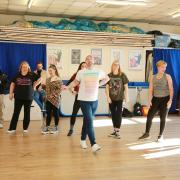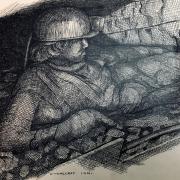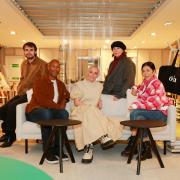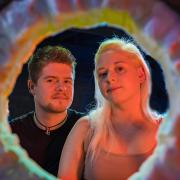As a forensic psychologist, Kerry Daynes from Bramhall, has spent a career discovering the darkest side of people’s minds and souls. Yet in her fascinating new book she insists there’s light in all of us

There are moments, reading Kerry Daynes' book, The Dark Side of the Mind, when you wonder just how she got up and went to work each day. The forensic psychologist has written a gripping memoir of her nearly 20-year career studying and treating some of the darkest minds: serial killers, sex offenders and perpetrators of violent crime.
Or, clients, as Kerry calls them.
As any fans of true crime books, podcasts and dramas (that's pretty much all of us, figures show) would expect, there are some horror stories detailed in the book - crimes that make your toes curl. But what Kerry is so brilliant at, is dissecting the people behind the crime until you feel, if not sympathy for the perpetrator - she's not here to give her characters a redemptive Hollywood twist - at least an understanding of what drives them. 'I don't have empathy for these people who have committed terrible crimes,' she clarifies, 'But I do have compassion for them. It's a basic human decency, but something that I think many of us can lack, especially on social media.'
At times, the way Kerry so skilfully layers a patient's history with the circumstances of their life, you end up thinking that if the same perfect maelstrom of terrible events had happened to you, maybe you'd be capable of things that are incomprehensible to most decent people. 'I wanted to humanise the people I've worked with,' she confirms. 'I started work at HMP Wakefield which is still [colloquially] called "Monster's Mansion" and I'm always asked who is the most evil person I've worked with. But we've got to stop this idea of seeing other people as monsters. They are human beings, and we've probably got a lot more in common with them than we like to think."
Despite the heavy subject matter, Kerry, 45, is bubbly and warm but 'no nonsense; that's the northerner in me'. Her tone in the book is that of confiding friend, rather than a clinical professional. 'Writing the book was a bit like therapy,' she says. 'I don't often talk about what happens at work, so this was a very emotional process. There's huge power in telling your own story.'
Interweaved with her (heavily disguised) cases, such as her first murder case, committed by a woman who had been emotionally and physically abused for years and whom Kerry helped avoid a prison sentence, she weaves in her own dramatic storyline that includes an abusive relationship, a terrifying stalking ordeal and burnout from the pressures of her work.
It's a job that strangers are constantly surprised Kerry would do. 'People always say, "You don't look like a forensic psychologist"," she says, amused. "What they mean is that I don't look like Robbie Coltrane from Cracker! But statistics show that nearly 80% of forensic psychologists are women." She believes that women's natural empathy helps with the job. Indeed, amid the horror stories detailed in the book, there are touching tales of emotion and connection she experiences with her clients. Such as a moment of side-splitting laughter with a man who was on suicide watch, after being imprisoned for GBH. His laughter led to tears and for the first time in his life he opened up. When you read the anecdote you see the person who, because of the crime he committed, you want to write off.
Her first job was at HMP Wakefield, where as a 23-year-old with no formal training, she was unbelievably tasked with interviewing sex offenders, to establish their motivations during an attack. But more horrifying than that, was the sexual harassment she endured at the hands of the prison guards, including heavy-handed searches on the way in to her workplace. It was also there that she met a boyfriend, a prison officer, who would end up being abusive, the toll of which made her life, and career, a misery. After taking her ex to court and seeing her private life splashed across tabloids - think pretty psychologist and prison guard - mysteriously, her contract was not renewed despite a perfect work record.
It's one of the nuanced messages of the book: that things aren't as black and white as they seem. 'Just because someone's in a uniform doesn't mean they are good,' she says. A message she had to learn fast.
After the stress of the experience, she developed a debilitating, but rare condition called Ménière's disease, which affects the inner ear. "I'm deaf in one ear, so I'm a psychologist who is literally unbalanced,' she laughs. But it has a very serious side effect: 'When I reach a maximum point of stress, I become dizzy and fall over. In a way, it's a blessing; it's forced me to practice what I preach as a psychologist and learn to manage my stress levels.'
She may be dealing with it but there are undeniable scars from such a career choice. She has two Chow Chow dogs, Fozzchops and Humphrey, because, after enduring years of stalking by a total stranger, 'I wanted to feel safe and Chow Chows are a cross between a bear and lion; protective.'
Aside from walking them in the Cheshire countryside ('I am the Cheshire stereotype, always out in my Barbour jacket and wellies') she switches off by watching 'rubbish telly', but perhaps not what most of us watch: 'Everyone wanted my opinion on who was H in The Line of Duty, but I don't want shows like that - or true crime. It's just not relaxing for me.'
In fact, she has issue with our obsession with true crime, from hit podcasts like Serial to the Netflix series, Making of a Murderer. '[Those kind of programmes] do grip the imagination, I get it, but they're not representative of real life: we're very unlikely to be attacked by a random serial killer in the night, and I worry that it makes people, but especially women, more scared.'
Kerry, who has stepped away from much of this kind of case work and now works with women victims, as well as doing television appearances and motivational speaking, recognises that readers will come to her book 'for the eye-watering stories'. But she wants to send them away with a different message. 'We can all be sensationalised and get incredibly angry, especially when newspapers and politicians are all shouting about the worst things that are happening. But we need to remember to have compassion.
'I've seen the worst things that people can possibly do, but I've also seen the best in people. How people react when bad things happen can be so inspiring. We are all a lot stronger than we think.'
The Dark Side of the Mind: True Stories from My Life as a Forensic Psychologist by Kerry Daynes is out now.



























